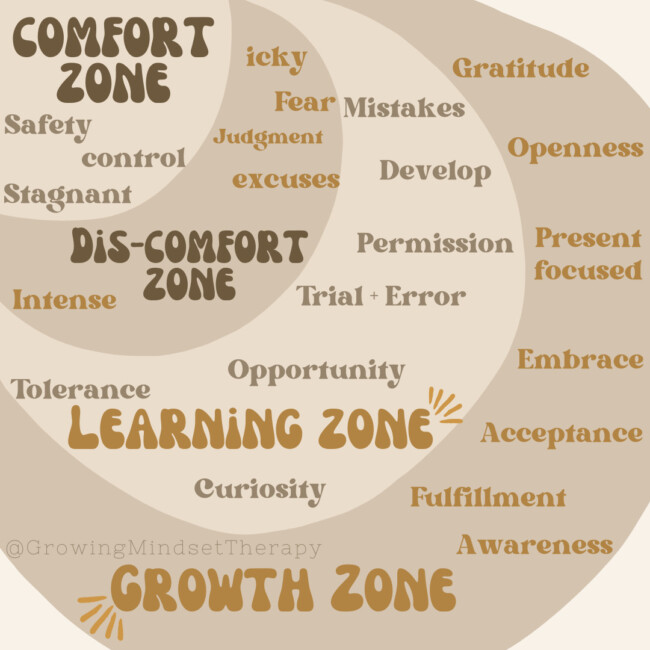For such evolved beings, people sure dislike change. Even the word is enough to make some people start to sweat. Here in Hudson County, with the hustle of the city forever the backdrop of our lives, things can feel like they are moving at a breakneck pace and we don’t always have time to manage our approach to change — especially when it comes to moving from one life phase to the next. To help navigate these changes, we’ve enlisted the help and advice from local Hoboken + Jersey City therapists. With a bit of guidance and some healthy perspective, we can come to realize change is not only inevitable, but with it comes growth, lessons, power, intention, and more. Read on for more tips and advice from local pros on how to approach change.

Before leaning into the possibilities that change can offer, it’s essential to acknowledge the grief that can come with some changes. Feel the feels, acknowledge the sadness, and grieve what is being left behind. You don’t have to live permanently in these feelings, but if you don’t let them pass through, you risk them festering and getting stuck. More on this later.
Read More: Arriving at Burnout? Here’s How to Cope — From a Local Therapist
Mollie Busino of Mindful Power LLC shared, “Moving through any life shift and role it is always helpful to: be as realistic with your expectations of the time it takes to move through a transition, take some time to identify what your top five values are at that moment, find a way to connect to your past role while moving into your new role, checking in with what you are feeling and thinking as you go through the transition, acknowledge what is “working” for you during the transition, and problem solve what is not working that is controllable.”
Think of the change as a puzzle that you want to solve. First things first, lay out the pieces to get an understanding of what you’re in for. Here are some questions to help you create a blueprint:
- What is changing? Pinpoint the changes. Try to remain factual, notice the emotions that surface because they have helpful information, this question is all about observing and noticing.
- Why is it changing? Look to understand what it is that is driving the change. Is this internal, or self-inflicted? Is this external, and potentially unwanted or uncontrollable?
- How will it affect various aspects of your life? What impact will this change have on your relationships, career, family, etc?
- How will it affect you personally? This final question zooms in a bit. How will this impact your day-to-day life? What impact might this have on your well-being? How do you feel about the change?
Now that the change has been thoroughly assessed, it’s time to discuss some tips for navigating through this time. As previously mentioned, life is full of changes and this change is likely not your first rodeo, so ask yourself: What has worked in the past? How have you navigated uncertainty and change? What didn’t work, and can you use this as a lesson to approach this change differently?
And don’t let toxic positivity fester. It’s perfectly okay to grieve during a season of change. Alex Bykowski LCSW says, “There’s no linear path for change, the hard truth is that things might not play out the way you expect them to. Adaptability is extremely important.” Acknowledge the sadness, talk about it, and grieve what is being left behind. You don’t have to live permanently in the feelings, but if you don’t let them pass through you risk them festering and getting stuck. Ask for help. Lean on the people that care about you for support. If this still seems too overwhelming, seek professional support.
If the change is unwanted, it can be even more important to be patient during this time. Dealing with a change you had not bargained for poses a unique challenge in that there is little or no motivation to do the work that is required. Feel, grieve, connect with others, get professional support, and be.

Here are some tips from other local therapists on how to navigate specific changes:
Student to Career
Courtney Glashow, LCSW psychotherapist + owner of Anchor Therapy in Hoboken says, “Don’t compare yourself to others. This is the beginning of your career so if it doesn’t work out, you can always make a change. Look for the positives happening around you. Allow yourself to have a learning curve since it takes time to adjust to the working world and a new job.”
Mollie Busino of Mindful Power LLC shared, “It is important to recognize that any shift in a role during various times in our lives is a process (what is defined as a transition) rather than a single event that occurs. With this being said- shifts take time and involve moving through different stages related to grief, identity, and integration. For example, a graduate of college moving into the role of a professional often needs to grieve the security of having the support of class syllabuses, possible familial financial support, being surrounded by peers in similar situations, and even geographic shift. This all happens while also learning new routines, meeting new people, developing financial limitations and goals, etc.”
Single Life to Married Life
Courtney Glashow, LCSW from Anchor Therapy says, “Remind yourself that every relationship is different. Attend marriage counseling to help better your relationship and communication. Listen to your partner with respect and openness. Continue to make time with friends/family without your spouse, and find hobbies or things you can do alone if you need more alone time.”
Kristen Hullinger, LCSW is a local, Gottman Certified, therapist. She shared, “Some say getting married and having a child are in the top five of stressful life transitions. So, when readying yourself for this in your life, it is normal to feel unsettled or nervous. It’s healthy to know when you join your life with another, things are going to change. It’s appropriate to be thoughtful about the change that will occur when a child comes into your life. Let yourself feel it.”
Parenthood
Courtney Glashow, LCSW from Anchor Therapy says, “Remind yourself that every child and every parent is different. Seek counseling with a licensed therapist who specializes in postpartum and parenting and join a group of moms who are in a similar situation as you (i.e. just had their first baby at a similar time). Be kind to yourself when you feel like you’re not doing the best or the most, and be aware of changing hormones that could be impacting your mental health.”
Alex Bykowski LCSW from Growing Mindset Therapy says, “I think we underestimate how important self-care is for parents, especially new parents. It’s critical to utilize self-care as much as possible. Like they say on an airplane, you can’t help anyone else if you don’t put your own oxygen mask on first.”
See More: Neutralizing Negative Thoughts — Body Image Edition From a Local Therapist
Take care of yourself. Be gentle. While you’ve overcome change in the past, the specific details of this change are still new for you, and you deserve some grace. Consider what advice or support you would offer to a friend or loved one. Try to give yourself that. Courtney Glashow LCSW says, “Have realistic expectations. Accept that change is part of life. Reflect on the benefits that change can bring to your life. Lean on the support system and friends/family during this time.”











